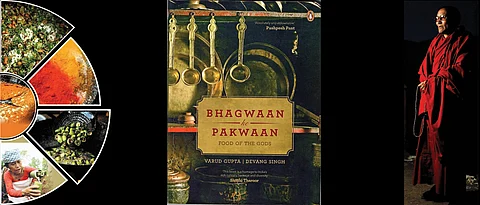

Varud Gupta and Dewang Singh toss faith, food and folklore in the right measure and come up with a delectable read — Bhagwaan ke Pakwaan. Interestingly, these very ingredients ensure that the book doesn’t fall under a specific genre. For the travel junkies among the readers, this is one adventure trip to interesting destinations. For historians and scholars, an insight into various cultures and for foodies, a real feast in the form of recipes — from Cicada Chutney to Akuri and Chitanee to Potol Paneer and lot more.
The writer-photographer duo along with Toni, their Man Friday, journeyed from Udvada in Gujarat to Spiti in Himachal Pradesh and Jagannath Puri in Odisha to Rongmesek village in Meghalaya, also visiting Kolkata. They came face to face with the cultures of some communities, which perhaps not many outsiders have had a brush with or written about, like the Baghdadi Jews of Kolkata, and learnt a good deal about their faiths and cuisines. The same has been shared with readers with the approach of an involved but non-judgemental observer. The reader gets a fair idea about the geographical location of the place and the customs prevalent in the community, a brief introduction to the local language and an in-depth information about their signature dishes. But the tone is always of a curious explorer. As Gupta explains in the Epilogue, what they had not anticipated was that they would also ‘become a part of a narrative’. And therein lies the appeal of the book.
Each chapter opens with an introduction to the place, the description of the journey to that place, introduction to its people — one or two among them specifically, then the traditions, evolution and lastly, the talk about food followed by recipes.
Singh and Gupta use their respective forte — pictures and prose — to the hilt. The images of the landscapes of Rongmesek and Spiti, the structures in Kolkata and Udvada are quite striking and so are the captures of humans — the young monks of Spiti, the cooks of Puri or the Karbi men and women. But it’s the food photographs, whether clicked in various stages of preparation or of the finished products, that take the cake.
And then Gupta spices things up further by adding a pinch of fun here and there. Sample this: “Next to us sat Dr Fabian Lyngdoh — also with a bamboo mug of rice beer — translating the local Khasi dialect of the man to his right (he wasn’t having any rice beer so we question his judgement)” or “Jagannath condones the millennial motto: Work hard, play hard. Since he didn’t have Netflix to unwind at night, Geeta Govinda, his favourite song about the relationship between Krishna and Radha, would be performed.” His headline for a passage on the Jhum tradition of cultivation of the Karbis is ‘Zara sa Jhum Loon’ while ‘To Pea or Not to Pea’ is how he begins talking about the shift in pea cultivation in Spiti and he calls the small chapter on Esther Victoria Abraham, ‘the badass chick’ who proves how ingrained people from the Jewish community became in Indian culture ‘Miss India’.
He in fact sets the tone for the book in the Prologue when he explains why despite ‘one of them being a confused atheist and the other a procrastinating agnostic’, they decided to write a book about faith. No wonder, noted Indian academic, food critic and historian Pushpesh Pant has said about the book, ‘If there’s a God and He lays his hands on a copy of Bhagwaan ke Pakwaan, he would I am sure roar with laughter, working up a healthy appetite’.
BHAGWAAN KE PAKWAAN
Author: Varud Gupta & Dewang Singh
Publisher: Penguin Random House
Pages: 152
Price: Rs 599
